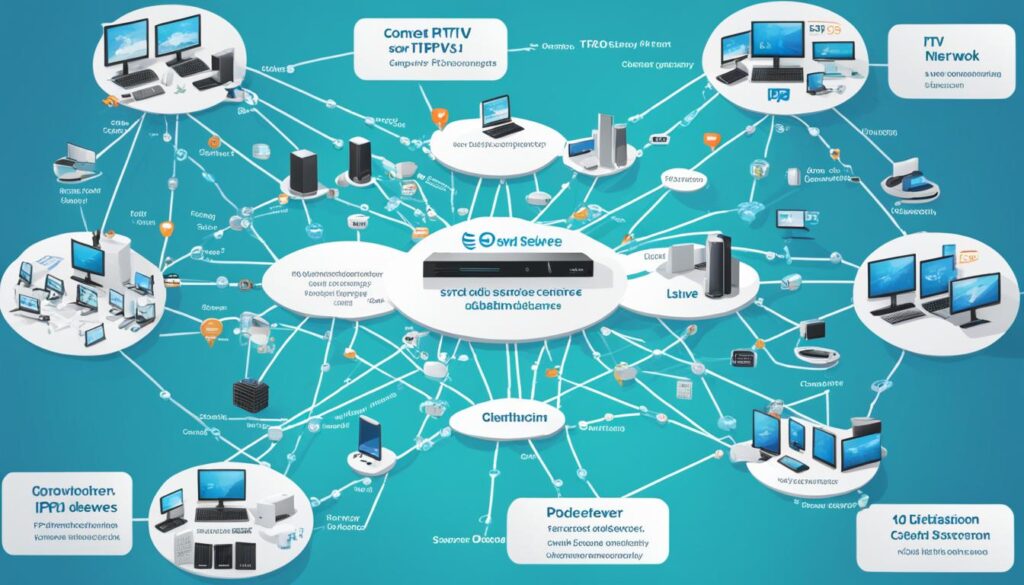As technological advancements continue to reshape the entertainment landscape, IPTV streaming technology has emerged as the next-generation television platform. It is redefining the viewing experience in Canada by offering an unparalleled blend of interactivity, convenience, and high-quality content delivery over TCP/IP networks.
By leveraging internet-based transmission, IPTV provides Canadians with seamless access to a diverse range of entertainment options, from live television programming to on-demand video content. This transformative technology is revolutionizing traditional television consumption, providing an enriched and highly personalized experience.
Key Takeaways
- IPTV streaming technology serves as a modern alternative to traditional broadcasting methods.
- The Canadian entertainment industry is experiencing a revolution driven by IPTV’s interactive and on-demand capabilities.
- Next-generation television utilizes private networks to enhance viewer engagement and content delivery.
- Canadian audiences benefit from a wide selection of IPTV services tailored to their individual preferences.
- IPTV efficiently leverages existing internet infrastructure to provide high-quality streaming experiences.
Understanding IPTV and Its Role in Modern Entertainment

The evolving entertainment landscape in Canada is increasingly embracing IPTV as a compelling alternative to traditional television services. Its adaptability and capacity for customization align with the growing demand for personalized viewing experiences, leveraging the expansive reach of internet connectivity. IPTV embodies the convergence of cutting-edge technology and diverse content, fundamentally changing how Canadians consume media.
A distinguishing feature of IPTV is its subscription-based model, which grants users greater control over their viewing habits. Unlike conventional television networks with rigid programming schedules, IPTV empowers subscribers to choose what they watch and when they watch it. This paradigm shift underscores a broader trend in content consumption, where viewers dictate their own entertainment experience.
What IPTV Is and How It Differs from Traditional TV
Internet Protocol Television (IPTV) is revolutionizing television viewing by streaming video content directly to users’ devices over the internet. Unlike traditional television, which relies on one-to-many signal transmission, IPTV establishes a more direct and interactive connection between content providers and audiences. This technological advancement enhances viewer engagement by enabling them to actively interact with the content rather than passively consume it.
The Technology Behind IPTV Streaming
At the core of IPTV’s modern entertainment capabilities lies sophisticated streaming technology designed to ensure seamless and dynamic content delivery. The integration of high-speed broadband and advanced internet infrastructure enables stable, high-quality video streaming, regardless of content complexity. This technological synergy has transformed the roles of both broadcasters and viewers, positioning Canada’s IPTV services as a cornerstone of contemporary entertainment.
Key Differences Between Traditional TV and Canada IPTV Services
| Feature | Traditional TV | Canada IPTV Services |
|---|---|---|
| Content Delivery | Broadcast signal transmission | Direct streaming via internet protocols |
| Viewer Control | Fixed schedules | On-demand access and recording |
| Service Integration | Standalone | Integrated within digital service packages |
| Customization | Limited | Highly personalized content and interfaces |
Beyond content delivery, IPTV has evolved into a comprehensive multimedia platform, influencing not just television consumption but also broader digital media interactions in Canada.
The Fundamentals of IPTV Infrastructure
The efficiency and reliability of IPTV services rely on a robust network infrastructure that facilitates seamless content delivery. This advanced framework is supported by a network of content servers and state-of-the-art streaming protocols tailored to the specific requirements of IPTV platforms.
Content Delivery Networks (CDNs) play a pivotal role in optimizing IPTV performance by ensuring consistent, smooth streaming experiences, even during peak viewing hours. These networks mitigate latency and maintain service reliability, particularly for high-demand services such as live streaming and Video On Demand (VOD).
Ensuring security and scalability is essential in today’s IPTV ecosystem. Encryption protocols, including Digital Rights Management (DRM) and Conditional Access Systems (CAS), safeguard content against unauthorized access. Additionally, cloud-based solutions enhance the scalability of IPTV platforms, allowing providers to adapt dynamically to increasing user demands.
Components of IPTV Network Infrastructure
| Component | Function | Role in IPTV Infrastructure |
| Content Servers | Store and distribute video content | Central hub for on-demand content and live streaming |
| Private Networks | Secure data transmission | Dedicated bandwidth for enhanced service quality |
| CDNs | Content distribution | Reduces latency and optimizes streaming performance |
| DRM/CAS | Content security | Protects content rights and ensures authorized access |
| Cloud Services | Infrastructure scalability | Enables flexible expansion of IPTV services |
For IPTV providers and consumers alike, understanding these infrastructure components is crucial in selecting and delivering optimal streaming services.
Canada IPTV Services: Market Overview

The Canadian IPTV market is undergoing rapid expansion, with major telecommunications providers and niche IPTV services competing for consumer attention. As demand for high-speed streaming and premium content grows, the industry continues to innovate, offering an ever-expanding range of viewing options.
Leading IPTV Providers in Canada
Prominent industry players have leveraged their telecommunications expertise to develop reliable IPTV services with high-speed content delivery. These providers have transitioned from traditional cable and satellite systems to advanced IPTV platforms that cater to the evolving demands of modern audiences.
Niche IPTV Services in Canada
Alongside mainstream providers, specialized IPTV services are gaining traction by offering exclusive content tailored to diverse viewer preferences. These niche platforms cater to specific entertainment needs, setting themselves apart from larger corporate competitors.
Overview of Canadian IPTV Providers
| Service Provider | Type of Service | Featured Content |
| Verizon FiOS | Mainstream | Extensive live TV and VoD options |
| Netflix | On-Demand Streaming | Exclusive series, films, and documentaries |
| Bell Fibe | Mainstream | Live media, sports, and time-shifting service |
| FalconTV | Niche | International programming and specialized genres |
| IPTV Trends | Niche | Customizable channel lineups and premium content |
| King TV | Niche | Entertainment packs with special-interest channels |
The increasing diversity in IPTV offerings reflects the evolving consumer demand for personalized, high-quality streaming services in Canada.
Content Delivery Networks: The Backbone of IPTV Streaming

Content Delivery Networks (CDNs) are essential in ensuring efficient and reliable IPTV streaming. By caching content closer to users, CDNs minimize transmission distances, reducing buffering times and enhancing overall streaming quality.
CDNs function similarly to well-organized libraries, systematically distributing content to ensure quick and efficient access. This infrastructure enhances user experiences by reducing load times, managing traffic surges, and maintaining consistent service availability.
The Impact of CDNs on IPTV Performance
| Aspect | Impact of CDN |
| Load Time | Reduces latency by delivering content from the nearest server |
| Scalability | Manages increased traffic during peak events |
| Reliability | Provides redundancy and failsafe mechanisms for uninterrupted service |
| Global Reach | Ensures international content delivery without speed compromise |
For IPTV services such as those available on leading platforms, robust CDN infrastructure is critical in maintaining seamless, high-quality streaming experiences.
Interactive IPTV Features Enhancing Viewer Experience
Canadian IPTV providers are continuously innovating, shifting television from a passive experience to a dynamic and interactive platform. Key advancements include on-demand content, live streaming, and AI-driven personalized recommendations.
Personalized IPTV Services and Content Recommendations
Middleware technologies are driving the personalization of IPTV experiences, enabling features such as tailored advertising and automated content suggestions. These innovations ensure that IPTV remains at the forefront of modern entertainment by delivering customized, engaging, and immersive viewing experiences.
The Evolution of IPTV Technologies and Protocols
The IPTV landscape in Canada has evolved significantly, transitioning from early digital signal transmission via DSL to sophisticated streaming protocols such as RTSP and HTTP. These advancements have refined content delivery processes, enabling IPTV platforms to offer unparalleled efficiency, flexibility, and viewing quality.
As IPTV continues to advance, its role in shaping the future of digital entertainment in Canada is becoming increasingly prominent, ensuring that viewers receive an optimized, engaging, and interactive television experience.
IPTV Streaming Technology
The rapid evolution of IPTV technology continues to push the boundaries of digital entertainment, exemplified by advanced implementations such as adaptive bitrate streaming through MPEG-DASH. This protocol significantly enhances the viewer experience by dynamically adjusting video quality based on real-time network conditions, thereby minimizing buffering while maximizing visual clarity. These technological advancements underscore the industry’s commitment to adapting and meeting the growing demand of Canadian audiences for seamless, high-quality streaming services.
As viewers explore the diverse content offerings on platforms like https://theusaiptv.com/, they benefit from cutting-edge IPTV protocols designed to ensure optimal stability and clarity. These continuous innovations not only highlight the responsiveness of the industry but also position Canadian IPTV services at the forefront of digital entertainment, catering to an increasingly sophisticated consumer base with evolving expectations.
FAQ
What is IPTV Streaming Technology and How Is It Different from Traditional TV?
IPTV, or Internet Protocol Television, delivers television content over TCP/IP networks instead of traditional broadcasting methods. Unlike conventional television, IPTV operates on a subscriber-based model, allowing users to select content on demand and access live channels over private networks. This approach offers a more personalized and interactive viewing experience.
What Are the Core Components of IPTV Infrastructure?
The IPTV infrastructure is built on an advanced network architecture that includes content servers, specialized servers, middleware, and streaming protocols, all interconnected via private networks. This structure ensures a managed, high-quality service that is both reliable and scalable to meet user demand.
Which Are the Popular IPTV Providers in Canada?
Canada hosts several prominent IPTV providers, including Bell Fibe by Bell, Verizon’s FiOS, and the globally recognized streaming giant Netflix. These providers offer comprehensive services encompassing live television, video-on-demand (VOD), and seamless integration with high-speed internet and other digital solutions.
Are There Niche IPTV Offerings in the Canadian Market?
Yes, in addition to major providers, niche IPTV services such as FalconTV, IPTV Trends, and King TV cater to specific audience preferences by delivering specialized content. These services contribute to the diversity of Canada’s entertainment landscape, offering tailored viewing experiences for distinct market segments.
How Do Content Delivery Networks Support IPTV Streaming?
Content Delivery Networks (CDNs) play a critical role in IPTV streaming by optimizing content delivery through geographically distributed servers. By reducing latency and buffering, CDNs enhance streaming performance and ensure a seamless viewing experience, particularly during peak traffic periods.


